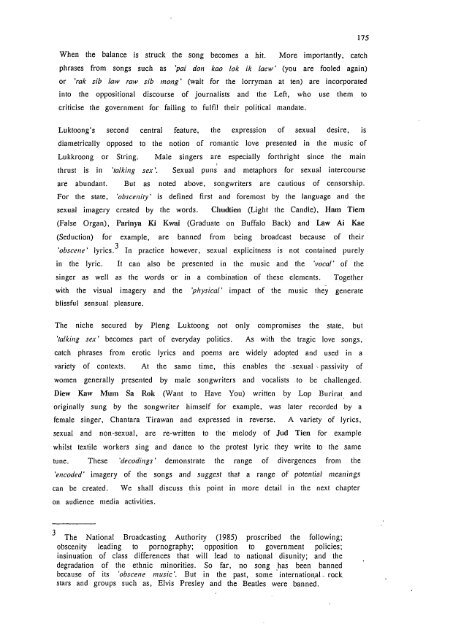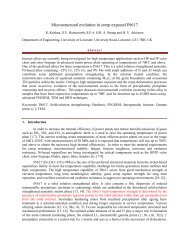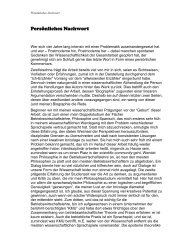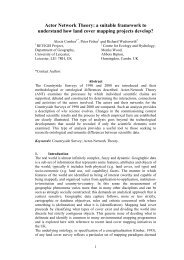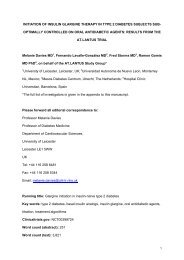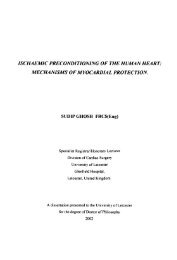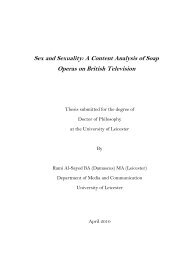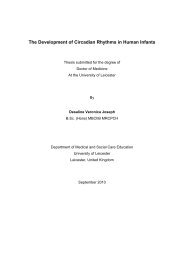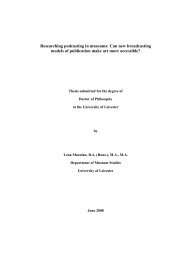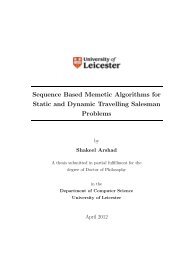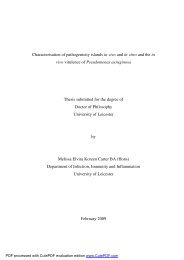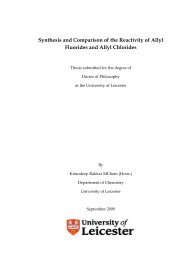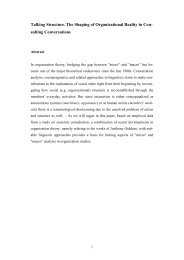iieiiei1eWrkers - Leicester Research Archive - University of Leicester
iieiiei1eWrkers - Leicester Research Archive - University of Leicester
iieiiei1eWrkers - Leicester Research Archive - University of Leicester
You also want an ePaper? Increase the reach of your titles
YUMPU automatically turns print PDFs into web optimized ePapers that Google loves.
When the balance is struck the song becomes a hit. More importantly, catch<br />
phrases from songs such as 'pai don kao bk ik laew' (you are fooled again)<br />
or 'rak sib law raw sib tnong' (wait for the lorryman at ten) are incorporated<br />
into the oppositional discourse <strong>of</strong> journalists and the Left, who use them to<br />
criticise the government for failing to fulfil their political mandate.<br />
Luktoong's second central feature, the expression <strong>of</strong> sexual desire, is<br />
diametrically opposed to the notion <strong>of</strong> romantic love presented in the niusic <strong>of</strong><br />
Lukkroong or String. Male singers are especially forthright since the main<br />
thrust is in 'talking sex'. Sexual puns' and metaphors for sexual intercourse<br />
are abundant. But as noted above, songwriters are cautious <strong>of</strong> censorship.<br />
For the state, 'obscenity' is defined first and foremost by the language and the<br />
sexual imagery created by the words. Chudtien (Light the Candle), Ham Tiem<br />
(False Organ), Parinya Ki Kwai (Graduate on Buffalo Back) and Law Ai Kae<br />
(Seduction) for example, are banned from being broadcast because <strong>of</strong> their<br />
'obscene' lyrics. 3 In practice however, sexual explicitness is not contained purely<br />
in the lyric. It can also be presented in the music and the 'vocal' <strong>of</strong> the<br />
singer as well as the words or in a combination <strong>of</strong> these elements. Together<br />
with the visual imagery and the 'physical' impact <strong>of</strong> the music they generate<br />
blissful sensual pleasure.<br />
The niche secured by Pleng Luktoong not only compromises the state, but<br />
'talking sex' becomes part <strong>of</strong> everyday politics. As with the tragic love songs,<br />
catch phrases from erotic lyrics and poems are widely adopted and used in a<br />
variety <strong>of</strong> contexts. At the same time, this enables the sexual passivity <strong>of</strong><br />
women generally presented by male songwriters and vocalists to be challenged.<br />
Diew Kaw Mum Sa Rok (Want to Have You) written by Lop Burirat and<br />
originally sung by the songwriter himself for example, was later recorded by a<br />
female singer, Chantara Tirawan and expressed in reverse. A variety <strong>of</strong> lyrics,<br />
sexual and non-sexual, are re-written to the melody <strong>of</strong> Jud Tien for example<br />
whilst textile workers sing and dance to the protest lyric they write to the same<br />
tune. These 'decodings' demonstrate the range <strong>of</strong> divergences from the<br />
'encoded imagery <strong>of</strong> the songs and suggest that a range <strong>of</strong> potential meanings<br />
can be created. We shall discuss this point in more detail in the next chapter<br />
on audience media activities.<br />
The National Broadcasting Authority (1985) proscribed the following;<br />
obscenity leading to pornography; opposition to government policies;<br />
insinuation <strong>of</strong> class differences that will lead to national disunity; and the<br />
degradation <strong>of</strong> the ethnic minorities. So far, no song has been banned<br />
because <strong>of</strong> its 'obscene music'. But in the past, some international- rock<br />
stars and groups such as, Elvis Presley and the Beatles were banned.<br />
175


